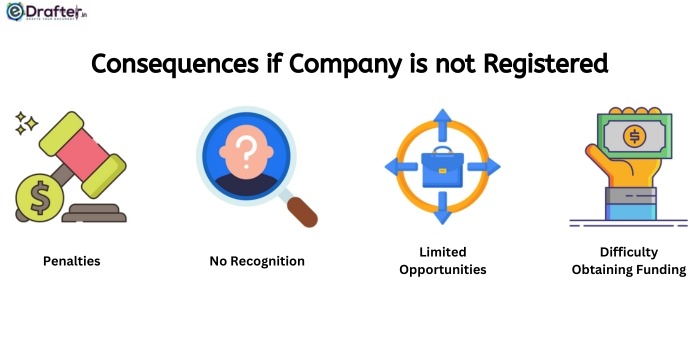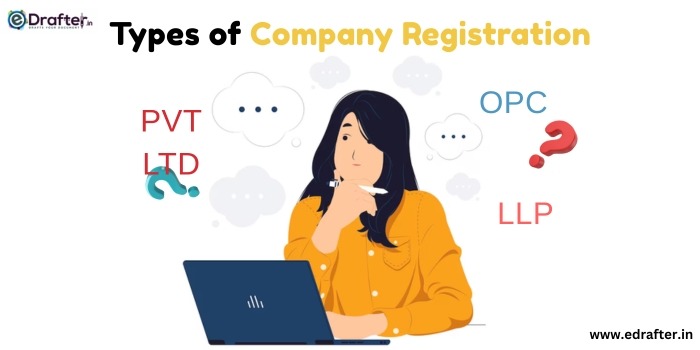
Table Of Content
- Is Registration Compulsory for Companies?
- What if a Company is not Registered?
- What are the Top Reasons to Register a Company in India?
- What are the Types of Company Registration?
- What Documents are Required for Company Registration?
- Which Type of Company Registration is Best?
- Is the Company Registration Number the Same as the GST Number?
- Is CA Required for Company Registration?
- Conclusion
- Frequently Asked Questions (FAQs)
There are numerous processes involved in registering a Company. Before forming a Company, the structure of the firm should be determined, i.e. whether the Company will be registered as an OPC, LLP, or Private Limited Company. After determining the structure, the Company name must be determined, and the directors must obtain DIN and DSC before applying for Company Registration.
Following the selection of a Company name and the acquisition of a DIN and Digital Signature Cetificate, the Company Registration form must be submitted to the MCA portal. The SPICe+ form, also known as the Company Registration form, must be completed, and the necessary papers must be uploaded and submitted online via the MCA site, along with the prescribed payments. The ROC will provide the Company incorporation certificate after verifying the SPICe+ form. The incorporation certificate serves as confirmation of the business’s Registration, and the Company will come into existence as a separate legal entity.
Is Registration Compulsory for Companies?
Yes, Registration for Companies is compulsory. When a Company is registered through the Ministry of Corporate Affairs. The Ministry’s main focus is on enforcing the Company Act 2013, the Companies Act 1956, the Limited Liability Partnership Act of 2008, and other related Acts, rules, and regulations that are largely designed to control how the corporate sector operates legally. By registering the Company under Companies Act 2013 provides authenticity to the Company in the eyes of the public and the Government.
Also Read – Verified Digital Signatures
What if a Company is not Registered?
There are various consequences if the Company is not registered. Let us discuss it below:

- Penalties: All firms are required by the Company Act of 2013 to register with the MCA. Should a business neglect to comply, it may face fines or penalties. The fine for failing to register a corporation might reach Rs. 10,000 for each day that the default continues.
- No Recognition: In the absence of MCA Registration, a Company’s legal status is deemed to be that of its owners’. As a result, any debts or legal problems the business may have could make its owners personally accountable. The business is also unable to enter into agreements, possess real estate, or take use of different funding sources.
- Opportunities for business is Limited: A corporation must be registered with the MCA in order to take advantage of several business possibilities, such as government contracts. The business might not be able to take advantage of these prospects without registering.
- Difficulty Obtaining Funding: Before making an investment or extending a loan to a firm, banks and investors usually demand that the Company be registered with the MCA. If the business isn’t registered, it can have trouble getting the money it needs to develop and flourish.
What are the Top Reasons to Register a Company in India?
If you are willing to start a business then registering the company should be your first priority but why? There are various reasons to register a firm in India and some of the major ones are below outlined.
- Credibility: A registered business is more credible and trustworthy than the businesses which are not registered.
- Funding from Investors: Investors like to invest their capital in registered organizations only.
- Tax Benefits: Only Registered companies can enjoy various tax benefits offered by the government for businesses such as tax exemptions and low tax rates.
- Legal Protection: A registered company in India has a separate legal entity from its owner therefore your business is protected from your personal debts and liabilities and vice versa.
What are the Types of Company Registration?
There are 3 major Company Registration which are as follows:
Private Limited Company
A Private Limited Company is a private organization that is held by shareholders who have each contributed a certain amount of capital in the Company. In a private limited Company, the risks of confronting liabilities that must be shared by the shareholders are reduced. They benefit from the Company’s profits in the form of dividends. Private Limited is the most commonly used legal abbreviation among businesses. Private limited is not classified by industry or size. Any profession can benefit from using the legal abbreviation Private Limited. As an example, A doctor, a shop, real estate firms, and so on.
Limited Liability Partnership
A Limited responsibility Partnership Organisation is a corporate business form in which the partners are not subject to infinite responsibility and there is no limit on the number of partners. An LLP Company is a separate legal entity in the public eye that exists regardless of the number of partners or even if all of the partners do not exist. An LLP Company can enter into contracts and own property of any kind. To function efficiently, the partners must enter into a contract with the LLP; this agreement protects the mutual rights and rules of both the partners and the LLP, but the LLP retains decision-making authority because it is a separate entity.
One Person Company
A One Person Company (OPC) is a sort of business structure in which a single person can incorporate a Company with limited liability and complete control over its operations. It is a legal entity separate from its owner, making it a popular choice in India for solitary entrepreneurs and small firms. All the work is managed by a single person. The single person himself enjoys the profit & Losses of the Company.
There are plenty of other types of Company Registration but we have discussed the ones which most businessmen get registered in.
What Documents are Required for Company Registration?
Documents vary to the Company type you are choosing. There are various types of Company structure which businessmen opt for. The documents for fellow Company structure are as follows for Registration of Company:
Documents Required for PRIVATE LIMITED Company
- PAN Card of the Directors.
- Aadhaar Card of the Directors
- Bank Statement
- Latest Electricity Bills
- Latest Mobile Bill
- Passport Size photographs of the directors
- Board Resolution Authorising Investment
- Investing Company Address Proof
- Recent Utility Bill for Business proof
Documents Required for One Person Company
- Articles of the Association which lays down the laws on which the Company operates.
- Memorandum of Association (MoA) which states the business for which the Company will be incorporated.
- Proof of ownership of the registered office/NOC from the owner.
- The Director’s Consent in Form INC-2 will be taken with his PAN Card and Aadhaar Card.
- A declaration by the professional certifying that all the compliances have been made.
- Consent and Declaration of the Director of DIR -2 and INC – 9 respectively.
Documents Required for Limited Liability Partnership
- Pan Card of the Directors
- Passport of the Directors
- Voter ID Card of the Directors
- Driving License
- Electricity Bill
- Telephone/mobile Bill
- Adhaar Card of the Directors
- Bank Statement of the Directors
- Passport Size Photo
- Ration Card
- Recent Utility Bill (For business purpose)
Which Type of Company Registration is Best?

A simple answer to this is Private Limited Company it is the most commonly used Company name among the businesses. It has its own number of benefits. Firstly, it gives a separate identity to the Company. The liability is limited plus the profits and losses are shared among the shareholders. There is no compulsion in professions. Any type of profession can adopt this Company name for example, Doctor, legal services Company, real estate, sole proprietor, etc.
If you are planning to register your company, we highly recommend that you also apply for trademark registration to protect your brand logo, slogan, and other intellectual property.
Is the Company Registration Number the Same as the GST Number?
No, GST Registration and Company Registration are two very separate things.Among the many variations are the following:
- The Companies Act of 2013 governs Company Registration, while the CGST, SGST/UTGST Act of 2017 governs GST.
- If the GST Law’s threshold limit and other requirements for Registration are satisfied, you may not need to register a Company but still need to get a GST number.
- If you meet all of the requirements for GST Registration, you can establish a Company without having to get a GST number.
Is CA Required for Company Registration?
In India, a business usually takes the form of a Company. The Companies Act of 2013 is followed by the legal entity of each firm and the Registration procedures. Throughout all of the stages, the role of the Company secretary or chartered accountant is critical. The Registration procedures are managed by the ROC office. Nonetheless, the procedures necessary to validate the various phases are carried out by a chartered accountant. The article discusses how important a chartered accountant is to the Registration of any Company. A Chartered Account plays a very important role in establishing and registering the Company.
Conclusion
So at last this statement is clear that if you want to start a business then getting it registered at MOC is compulsory for the authentication of your business both in front of the public and the Government. Now you can even get it registered through our help. We will guide you from the scratch to the bottom. So order now!
Frequently Asked Questions
How much time does it take to Register a Company?
A Company Registration has many processes involved which does take time and sometimes it takes a little more than usual time but a Company Registration process takes up to 15 working days.
Does a Company Registration Expire?
The validity of a Company Registration on the dissolution or life of the Company. Once you have got your Company registered then there is no need of re-Registration of that. The Registration is for lifetime. It depends on the Company’s life. Some dissolve earlier due to reasons and some grow in a wild way and go a long way.

